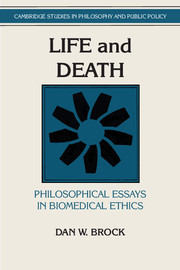Book contents
- Frontmatter
- Contents
- Sources and acknowledgments
- Introduction
- PART I PHYSICIANS AND PATIENTS MAKING TREATMENT DECISIONS
- PART II LIFE-AND-DEATH DECISIONS IN THE CLINIC
- PART III LIFE-AND-DEATH DECISIONS IN HEALTH POLICY
- 9 The value of prolonging human life
- 10 Quality of life measures in health care and medical ethics
- 11 The problem of low benefit/high cost health care
- 12 Justice and the severely demented elderly
- 13 Justice, health care, and the elderly
- 14 Truth or consequences: The role of philosophers in policy-making
- Index
9 - The value of prolonging human life
Published online by Cambridge University Press: 05 June 2012
- Frontmatter
- Contents
- Sources and acknowledgments
- Introduction
- PART I PHYSICIANS AND PATIENTS MAKING TREATMENT DECISIONS
- PART II LIFE-AND-DEATH DECISIONS IN THE CLINIC
- PART III LIFE-AND-DEATH DECISIONS IN HEALTH POLICY
- 9 The value of prolonging human life
- 10 Quality of life measures in health care and medical ethics
- 11 The problem of low benefit/high cost health care
- 12 Justice and the severely demented elderly
- 13 Justice, health care, and the elderly
- 14 Truth or consequences: The role of philosophers in policy-making
- Index
Summary
How is the value of prolonging human life properly determined? This is a question for both consequentialist and non-consequentialist moral theories. Consequentialists quite obviously need an answer to it, since their program of acting so as to maximize value or the good requires an answer to how much value or good is produced by prolonging life. Virtually all non-consequentialists also grant that prolonging human life is usually of value or a good. When non-consequentialist moral constraints (whether of duty, rights, or justice) do not otherwise limit action or policy, nonconsequentialists often seek to use efforts and resources to do the most good, and then need an account of the relative value of prolonging life.
The value of prolonging human life is, of course, not merely a problem for moral theory, but has great practical and policy importance in several areas: first, in the evaluation of a wide array of social, usually governmental, programs of environmental and safety protections and regulations whose explicit purpose is to save lives or to decrease persons' risk of death; second, in decisions about the acceptable level of risk to life that programs with other purposes may carry; third, in decisions about appropriate amounts to spend for life-sustaining measures such as health care. Perhaps because prolonging life has this policy importance in decisions about expenditures, both the theoretical and practical literature on principles and procedures for valuing lives has been dominated by economists and policy analysts.
- Type
- Chapter
- Information
- Life and DeathPhilosophical Essays in Biomedical Ethics, pp. 235 - 267Publisher: Cambridge University PressPrint publication year: 1993



